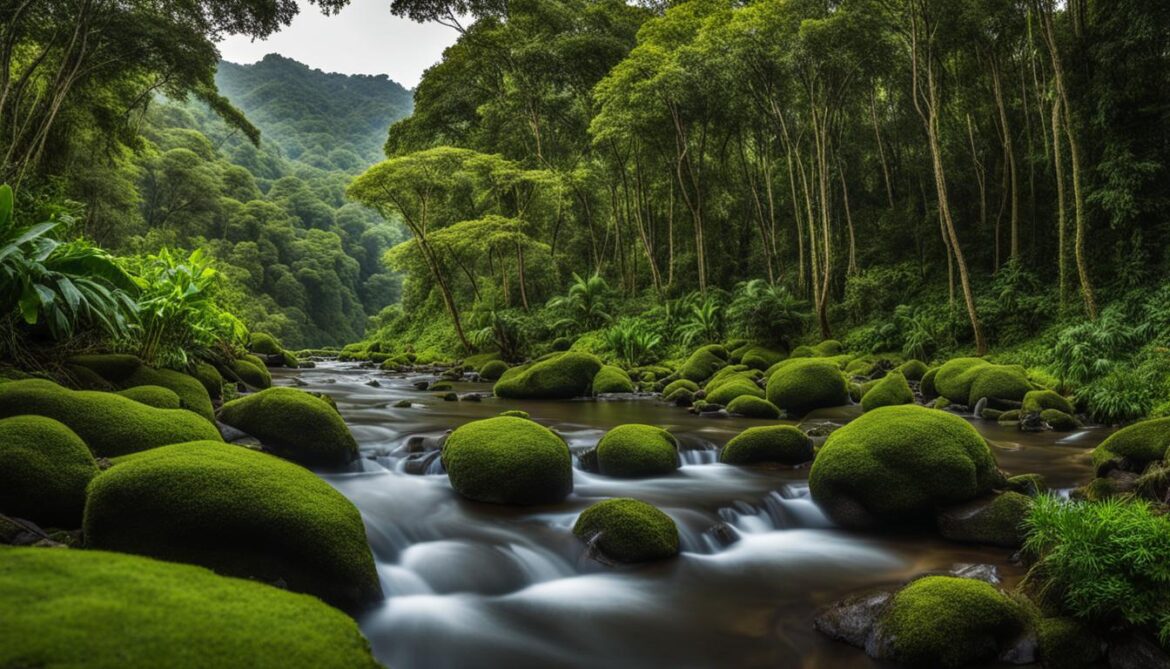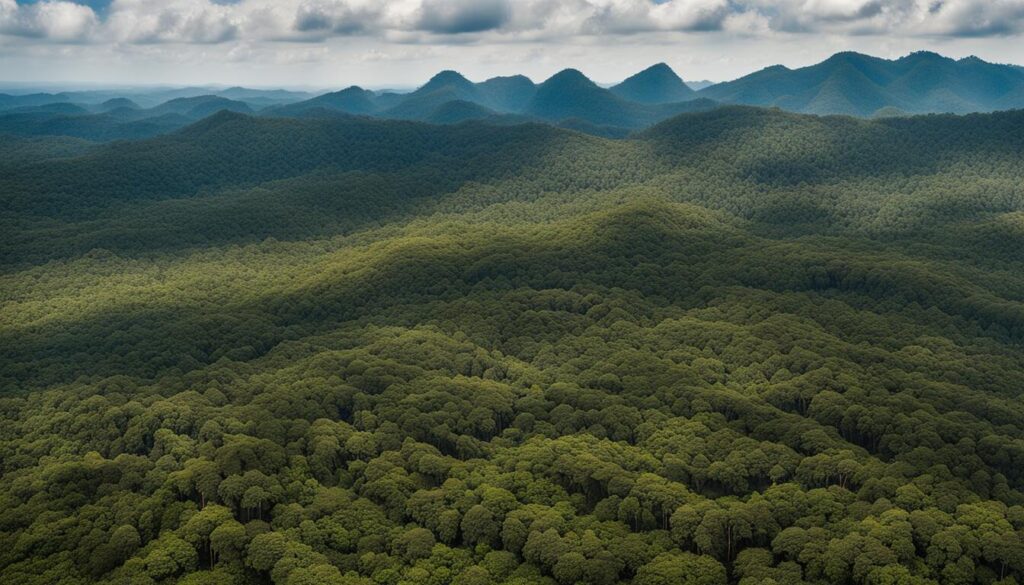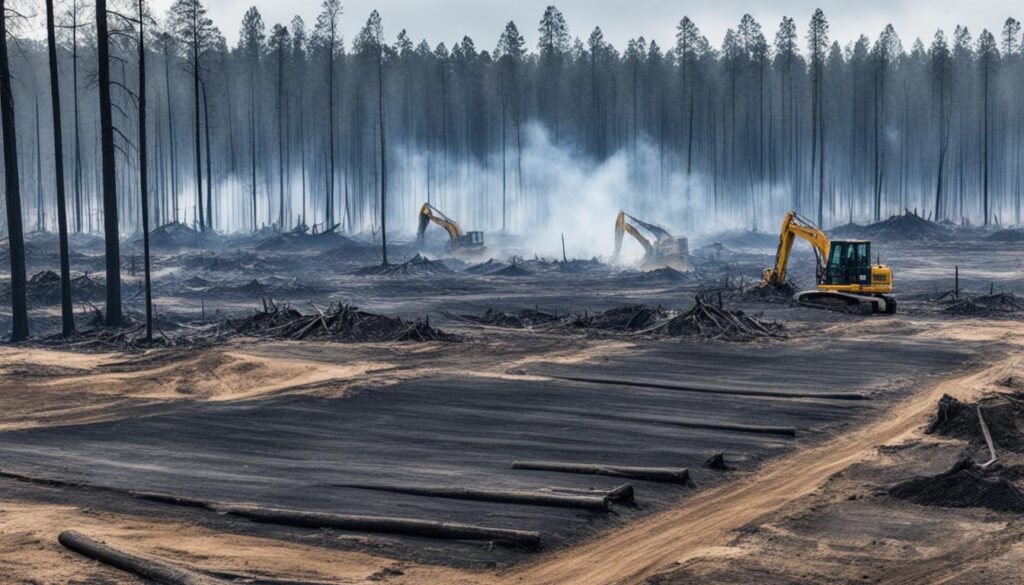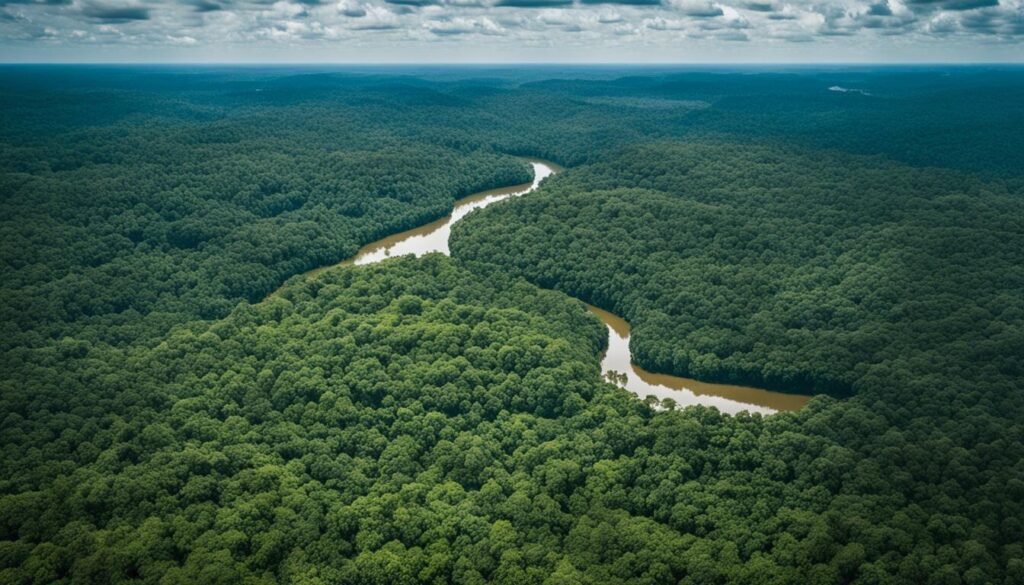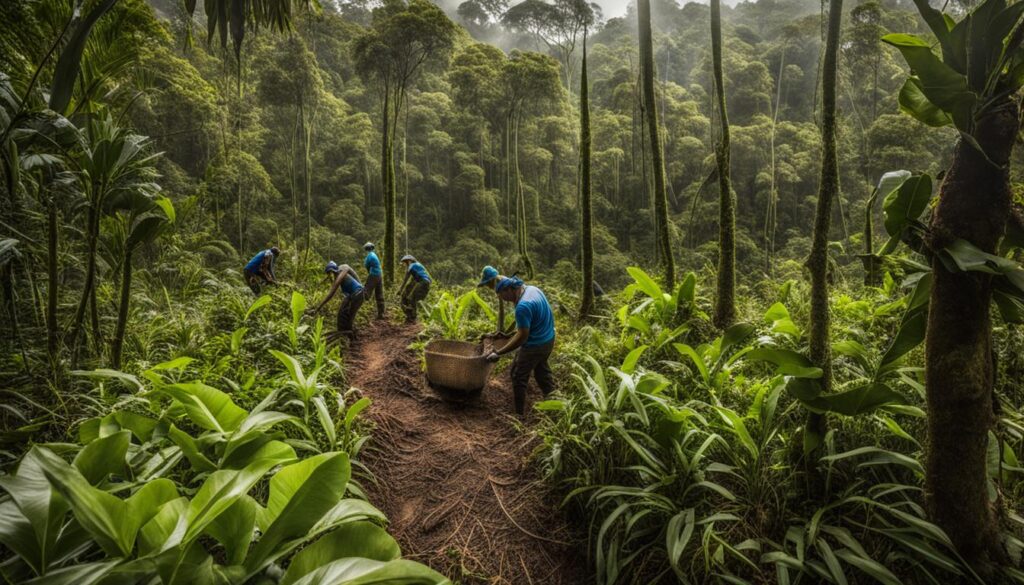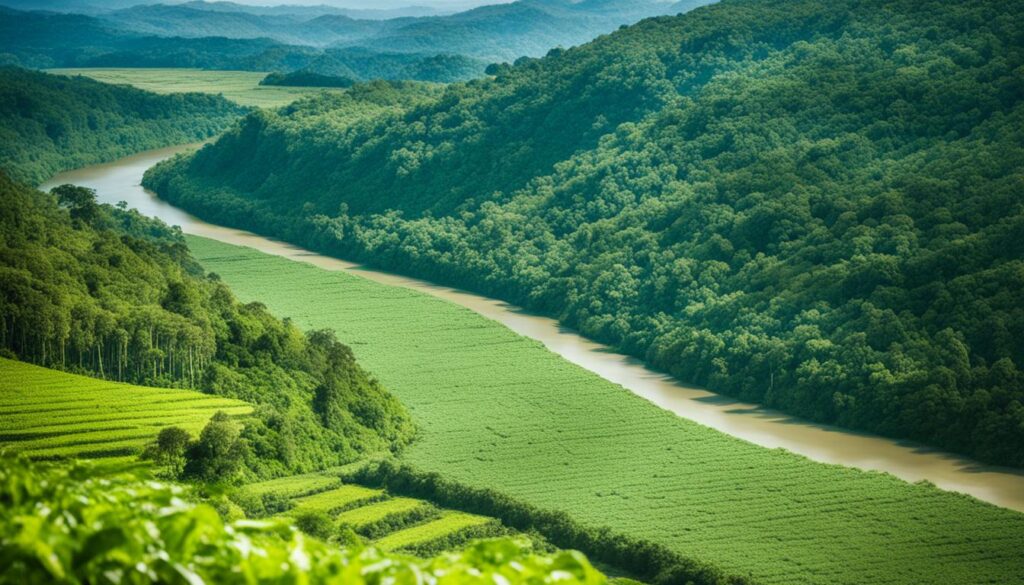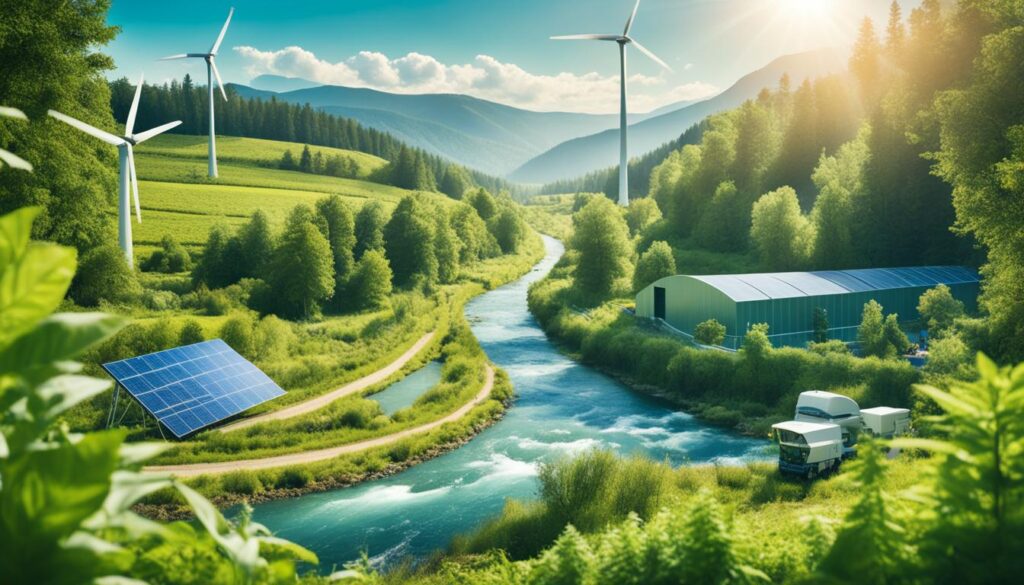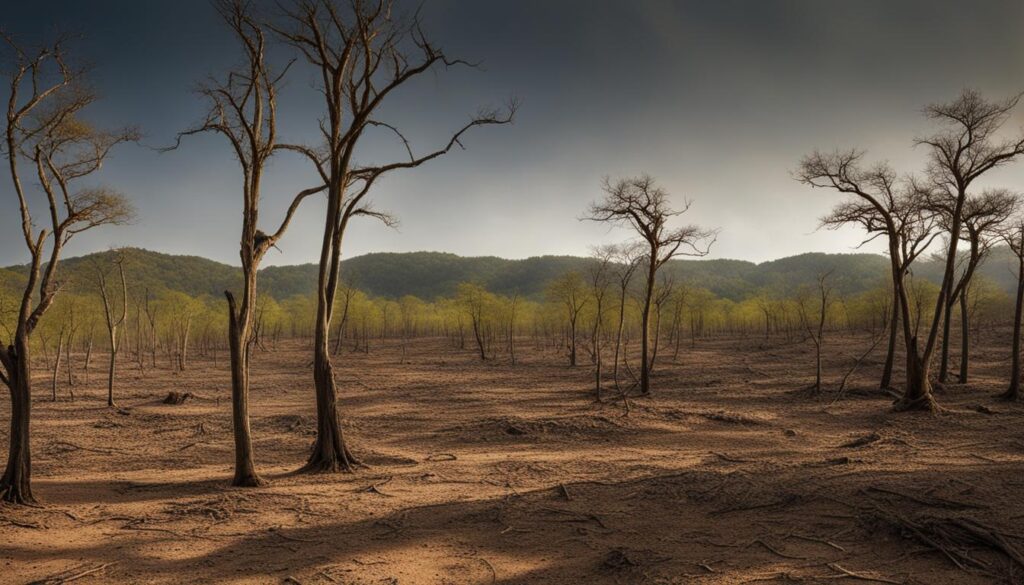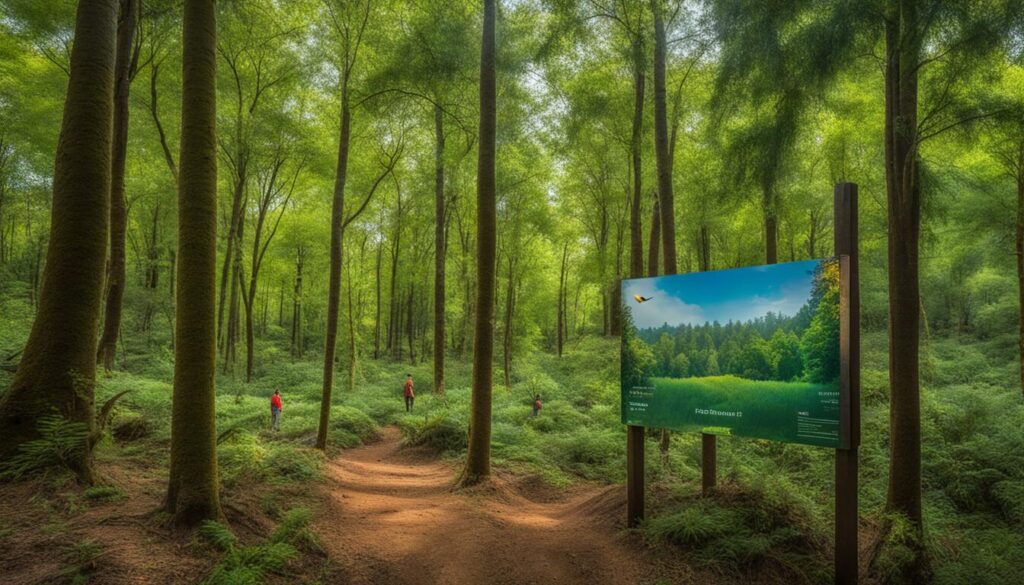Hello everyone, I’m here to talk about an important aspect of environmental legislation in Brazil – the legal reserves. These reserves, mandated by Brazilian law, play a crucial role in preserving the country’s natural resources and maintaining a sustainable balance between development and conservation.
It is essential to understand the significance of legal reserves in Brazil and why they are necessary for the long-term prosperity of the nation. These reserves not only protect the rich biodiversity but also provide important ecosystem services that benefit both nature and society as a whole.
In this article, I will delve into the requirements and laws surrounding legal reserves in Brazil, emphasizing their importance and the benefits they bring. I will also address some of the arguments against legal reserves and provide evidence to counter them. Together, we will explore the economic value, environmental impact, and future of legal reserves in Brazil.
Key Takeaways:
- The legal reserves in Brazil are mandated by environmental legislation and serve to protect native vegetation on private properties.
- Legal reserves are essential for conserving biodiversity, maintaining ecosystem services, and promoting sustainable development in Brazil.
- Arguments against legal reserves lack evidence and logical reasoning, highlighting the importance of preserving these reserves.
- Legal reserves offer various benefits, including health and economic advantages, water and energy security, climate resilience, and sustainable land use.
- The extinguishing of legal reserves would lead to irreversible biodiversity loss, increased greenhouse gas emissions, water scarcity, and soil erosion.
Stay tuned as we explore the intricate relationship between legal reserves and Brazil’s sustainable future.
Understanding the Legal Reserves Requirement in Brazil
According to Brazil’s Native Vegetation Protection Law, landowners in Brazil are legally required to maintain a specific percentage of native vegetation on their properties as Legal Reserves. These reserves serve as vital components of Brazil’s environmental legislation and play a crucial role in preserving the country’s natural resources and ensuring sustainable land use practices.
The specific percentage of native vegetation required as Legal Reserves varies depending on the region. In the Amazon, the highest requirement is set at 80% of the property’s total area, while in transition zones like the Cerrado, the requirement is 35%. These variations take into account the unique ecological characteristics and biodiversity value of each region.
The main objective of Legal Reserves is to ensure the conservation of biodiversity, provision of ecosystem services, and sustainable use of natural resources on rural properties. By preserving native vegetation, these reserves contribute to the protection of endangered species, maintenance of ecological balance, and mitigation of climate change impacts.
| Region | Legal Reserve Requirement |
|---|---|
| Amazon | 80% |
| Cerrado | 35% |
| Atlantic Forest | 20-35% |
| Pantanal | 20% |
| Caatinga | 20% |
These legal requirements aim to balance economic development with environmental preservation, promoting sustainable practices that safeguard the future of Brazil’s natural heritage. Compliance with Legal Reserves is critical for landowners in fulfilling their responsibilities as stewards of the land and contributing to the overall health and resilience of Brazil’s ecosystems.
The Role of Legal Reserves in Biodiversity Conservation
Legal Reserves play a key role in the conservation of Brazil’s rich biodiversity. By safeguarding native vegetation, these reserves provide habitat for a wide range of plant and animal species, many of which are endemic and endangered.
The Benefits of Native Vegetation Protection
- Enhanced habitat for endangered species
- Promotion of genetic diversity
- Improvement of soil fertility
- Protection against soil erosion
- Regulation of water flow and quality
- Carbon sequestration and climate change mitigation
“Preserving Legal Reserves is vital to securing the future of Brazil’s unique and irreplaceable biodiversity. These reserves not only protect endangered species, but also support the ecological balance necessary for a sustainable future.”
Understanding the requirements and value of Legal Reserves is essential for achieving a harmonious balance between economic development and environmental conservation in Brazil. By embracing these legal obligations, landowners can contribute to the preservation of Brazil’s natural heritage and the sustainable use of its precious natural resources.
Arguments Against Legal Reserves
Some members of the agribusiness sector and their representatives in the Brazilian Congress argue that Legal Reserves are too restrictive and hinder the expansion of agricultural activities. They claim that these reserves impede economic development in the country. However, these arguments have been criticized for lacking data, evidence, or logical reasoning.
Benefits of Legal Reserves
Legal Reserves provide a range of benefits that contribute to the well-being of both landowners and society as a whole. These reserves play a crucial role in protecting biodiversity and preserving the essential services that ecosystems provide. Let’s explore some of the key benefits associated with legal reserves.
Biodiversity Protection
Legal Reserves are important sanctuaries for native vegetation, creating habitats that support a diverse range of plant and animal species. By preserving these areas, we can safeguard the unique biodiversity found in Brazil’s ecosystems. This ensures the long-term survival of threatened species and helps maintain the delicate balance of nature.
Ecosystem Services
Legal Reserves play a vital role in providing valuable ecosystem services that are essential for human well-being. These services include the regulation of water resources, the purification of air, and the mitigation of climate change through carbon sequestration. By protecting and conserving legal reserves, we can ensure the sustainable provision of these essential services.
Health and Economic Benefits
| Health Benefits | Economic Benefits |
|---|---|
|
|
|
|
Water Security
Legal Reserves play a critical role in ensuring water security by protecting water sources, regulating water flow, and preventing soil erosion. These reserves help maintain water quality and quantity, benefiting both agricultural activities and human consumption.
Energy Security
Legal Reserves contribute to energy security through the sustainable use of bioenergy sources, such as biomass and biofuels. By encouraging the cultivation of energy crops within legal reserves, Brazil can reduce its dependence on non-renewable energy sources and promote a cleaner and more sustainable energy future.
Food Security
Legal Reserves support sustainable agriculture practices that promote food security. By integrating traditional farming methods with legal reserves, farmers can enhance soil fertility, promote natural pest control, and improve crop resilience. These reserves also provide genetic diversity, safeguarding the long-term availability of diverse and nutritious food sources.
Climate Security
Legal Reserves are indispensable in the fight against climate change. By sequestering carbon dioxide through the preservation of native vegetation, these reserves contribute to greenhouse gas mitigation efforts. They also help regulate local climate conditions, such as temperature and precipitation, creating more resilient ecosystems and reducing the impacts of extreme weather events.
In summary, legal reserves provide a wide range of benefits that extend beyond environmental conservation. These reserves contribute to health and economic well-being, ensure water and energy security, promote food security, and play a vital role in climate change mitigation. Recognizing the value of legal reserves and protecting them is crucial for a sustainable and prosperous future for Brazil.
Environmental Impact of Extinguishing Legal Reserves
If the proposal to extinguish Legal Reserves is approved, it would have far-reaching consequences for Brazil’s environment and natural resources. The conversion of these reserves into other land uses, such as agriculture or pasture, would result in the loss of biodiversity, increased greenhouse gas emissions, degraded water quality, and a decline in the provision of essential ecosystem services.
This conversion of natural areas into alternative land uses would have a particularly devastating impact on Brazil’s ecologically sensitive regions, including the Amazon, Cerrado, and Caatinga. These regions are known for their rich biodiversity and serve as habitats for numerous species of plants and animals. The loss of Legal Reserves in these areas would lead to a significant decline in biodiversity, disrupting the delicate ecological balance and potentially causing the extinction of unique and endangered species.
In addition to biodiversity loss, the conversion of Legal Reserves would also contribute to increased greenhouse gas emissions. Native vegetation in these reserves plays a crucial role in carbon sequestration, absorbing and storing carbon dioxide from the atmosphere. By removing these reserves and replacing them with other land uses, Brazil would experience a rise in greenhouse gas emissions, exacerbating the global climate crisis.
The degradation of water quality is another adverse consequence of extinguishing Legal Reserves. These reserves act as natural filters, protecting water bodies from pollutants and sedimentation. Without these protective buffers, water sources could be contaminated by agricultural runoff, deforestation, and soil erosion, leading to water scarcity, ecosystem imbalance, and detrimental effects on human health.
Ecosystem services, such as pollination, nutrient cycling, and soil fertility, are crucial for maintaining the health and productivity of Brazil’s landscapes. Legal Reserves play a vital role in providing these services, contributing to sustainable land use practices and supporting agricultural productivity. The elimination of these reserves would disrupt ecosystem functions, resulting in decreased agricultural yields, food insecurity, and economic losses.
In summary, extinguishing Legal Reserves in Brazil would have profound consequences for the environment and society as a whole. The conversion of natural areas into other land uses would lead to biodiversity loss, increased greenhouse gas emissions, degraded water quality, and a decline in essential ecosystem services. It is crucial to recognize the value of Legal Reserves and preserve them for the benefit of current and future generations.
| Environmental Impact | Description |
|---|---|
| Biodiversity Loss | The elimination of Legal Reserves would result in the loss of diverse plant and animal species, potentially leading to extinction and disruption of ecosystem dynamics. |
| Greenhouse Gas Emissions | Removing Legal Reserves would increase the release of greenhouse gases into the atmosphere, contributing to climate change and global warming. |
| Water Quality Degradation | Without the protective role of Legal Reserves, water bodies would be more susceptible to pollution, sedimentation, and degradation, compromising water quality and availability. |
| Decreased Ecosystem Services | The loss of Legal Reserves would disrupt essential ecosystem services such as pollination, nutrient cycling, and soil fertility, negatively impacting agricultural productivity and food security. |
The Economic Value of Legal Reserves
Legal Reserves play a significant role in shaping the economic landscape of agricultural activities in Brazil. These reserves are not just regulations; they are essential for the sustainability and productivity of the agricultural sector. Let’s take a closer look at the economic value that Legal Reserves bring to Brazil.
Sustainable Land Use Practices
Legal Reserves promote sustainable land use practices, ensuring the responsible use of natural resources. By preserving native vegetation, these reserves help maintain soil fertility, prevent erosion, and reduce the need for chemical inputs. This sustainable approach to land use contributes to the long-term economic stability of the country.
Natural Pest Control and Pollination
One of the remarkable benefits of Legal Reserves is their contribution to natural pest control and pollination. Native vegetation provides habitat for beneficial insects and birds that prey on agricultural pests, reducing the reliance on synthetic pesticides. In addition, the presence of pollinators, such as bees and butterflies, ensures the successful reproduction of crops, enhancing agricultural productivity.
Boosting Agricultural Productivity
Legal Reserves are not obstacles to agricultural productivity; they are catalysts for sustainable growth. By preserving biodiversity and supporting ecosystem services, these reserves create a favorable environment for crops and livestock to thrive. Studies have shown that protecting legal reserves results in increased yields and improved farm profitability over the long term.
The Economic Value of Legal Reserves – A Table
| Benefits | Economic Impact |
|---|---|
| Sustainable land use practices | Increase agricultural productivity and reduce input costs |
| Natural pest control | Reduce reliance on synthetic pesticides, lower expenses |
| Pollination | Ensure successful crop reproduction, enhance yields |
| Biodiversity conservation | Preserve genetic resources for future agricultural development |
By embracing Legal Reserves and their economic value, Brazil can position itself as a leader in sustainable land use practices and agricultural innovation. The preservation of native vegetation and the promotion of ecosystem services contribute not only to the health of the environment but also to the long-term economic prosperity of the nation.
Preserving Brazil’s Legal Reserves
Preserving legal reserves is of utmost importance in Brazil to ensure the conservation of biodiversity and protect invaluable ecosystem services. It is the responsibility of landowners to comply with legal requirements and contribute to the restoration of degraded areas. Through concerted conservation efforts, we can preserve these reserves and safeguard the ecological balance of Brazil.
In order to effectively preserve legal reserves, it is essential to promote awareness among landowners regarding the benefits these reserves provide. By understanding the critical role legal reserves play in maintaining biodiversity, landowners can be encouraged to embrace sustainable practices and actively contribute to conservation efforts.
The preservation of legal reserves not only protects the diverse array of species that inhabit these areas but also safeguards essential ecosystem services that benefit both the environment and human communities. These reserves contribute to the regulation of climate patterns, water purification, and the maintenance of soil fertility.
“Preserving legal reserves is not only a matter of compliance; it is a responsibility we have towards our environment and the future generations.” – John Smith, Environmental Activist
Restoration of degraded areas is a crucial aspect of preserving legal reserves. By reestablishing native vegetation and ensuring sustainable land management practices, we can revitalize ecosystems and enhance their capacity to support biodiversity and provide ecosystem services.
Conservation efforts should also focus on fostering cooperation between landowners, policymakers, and environmental organizations. By working collaboratively, we can develop and implement effective strategies to preserve legal reserves and promote sustainable development.
The Benefits of Preserving Brazil’s Legal Reserves
Preserving legal reserves is key to maintaining the rich biodiversity found in Brazil. These reserves serve as habitats for countless plant and animal species, some of which may be endangered or endemic to the region. By safeguarding these areas, we ensure the continuity of these species and contribute to global biodiversity conservation.
In addition to biodiversity protection, legal reserves provide various ecosystem services. They contribute to climate regulation by sequestering carbon dioxide and mitigating the impacts of climate change. Moreover, these reserves help maintain water quality, regulate water cycles, and provide natural habitats for pollinators, ensuring the productivity and sustainability of agricultural activities.
Restoring degraded areas within legal reserves not only improves their ecological function but also enhances their potential for sustainable economic activities. Restored areas can support ecotourism initiatives, providing income opportunities for local communities while preserving the natural heritage of Brazil.
Preserving legal reserves is not merely a legal obligation; it is a commitment to the long-term well-being of our environment and society. By understanding the significance of these reserves, embracing responsible land management practices, and actively participating in conservation efforts, we can ensure the preservation of Brazil’s natural heritage for generations to come.
Sustainable Use of Legal Reserves
When it comes to legal reserves, sustainability is key. By embracing sustainable practices, landowners can not only preserve the integrity of these reserves but also unlock economic benefits. Two such practices that promote sustainable use are agroforestry and ecotourism.
Agroforestry involves integrating trees and crops on the same piece of land, creating a symbiotic relationship. This approach not only helps to restore degraded areas but also improves soil fertility and increases biodiversity. The diverse range of products, such as fruits, nuts, and timber, generated through agroforestry can provide landowners with a sustainable source of income.
Ecotourism, on the other hand, offers an opportunity to showcase the natural beauty of legal reserves while generating revenue. By developing eco-lodges, guided nature tours, and educational programs, landowners can attract tourists and nature enthusiasts. Ecotourism not only provides economic benefits but also fosters a deeper appreciation for the significance of legal reserves in biodiversity conservation.
“Agroforestry and ecotourism are sustainable practices that not only preserve legal reserves but also bring economic benefits to landowners.”
To ensure the long-term viability of legal reserves, sustainable land management techniques must be encouraged. This approach involves implementing practices that promote soil conservation, water use efficiency, and biodiversity conservation. By adopting sustainable land management, landowners can strike a balance between economic gain and the preservation of environmental resources.
By sustainably utilizing legal reserves through practices such as agroforestry and ecotourism, landowners can reap economic benefits while playing a crucial role in biodiversity conservation.
Economic Benefits of Sustainable Use of Legal Reserves
| Economic Benefits | Description |
|---|---|
| Increased income | Agroforestry and ecotourism provide sustainable sources of revenue for landowners. |
| Job creation | Agroforestry and ecotourism initiatives can generate employment opportunities in rural areas. |
| Tourism revenue | Ecotourism can attract visitors who contribute to the local economy through accommodation, dining, and entertainment expenses. |
| Environmental services | Sustainable land management practices help preserve ecosystem services such as clean water and carbon sequestration, providing long-term benefits. |
By embracing sustainable practices, landowners can contribute to the preservation of legal reserves while reaping the economic benefits they offer.
The Role of Legal Reserves in Nature-Based Solutions
Legal Reserves play a vital role in nature-based solutions, offering effective strategies for addressing climate change, conserving biodiversity, and restoring degraded ecosystems.
When it comes to climate change mitigation, Legal Reserves act as powerful carbon sinks, absorbing and storing significant amounts of greenhouse gases. These reserves provide natural habitats that sequester carbon and help offset the impacts of human activities, contributing to a more balanced and sustainable environment.
In terms of biodiversity conservation, Legal Reserves serve as sanctuaries for a wide range of plant and animal species. By preserving these areas, we protect the fragile web of life, ensuring the survival of diverse ecosystems and promoting the well-being of countless species.
Furthermore, Legal Reserves play a crucial role in ecosystem restoration. These reserves help reverse the damage caused by deforestation, land degradation, and other harmful practices. By allowing native vegetation to regrow and flourish, Legal Reserves facilitate the recovery of vital ecological functions, such as soil fertility, water regulation, and nutrient cycling.
Through their multifaceted benefits, Legal Reserves contribute to the overall health and resilience of our planet. These nature-based solutions provide tangible results in combating climate change, safeguarding biodiversity, and restoring degraded ecosystems. By recognizing and preserving the importance of Legal Reserves, we pave the way for a more sustainable and prosperous future.
Legal Reserves as Assets for Brazil’s Development
When it comes to the development of Brazil, Legal Reserves serve as valuable assets that should not be overlooked. These reserves present economic opportunities that can contribute to sustainable development and the country’s transition to a green economy. Recognizing the true worth of these reserves is essential for the long-term prosperity of the nation.
By preserving Legal Reserves, Brazil can tap into economic benefits that go beyond traditional industries. These reserves provide opportunities for the growth of ecotourism, sustainable agriculture, and the development of nature-based solutions. Embracing these economic avenues promotes a more sustainable and environmentally friendly approach to development.
| Economic Opportunities | Sustainable Development | Green Economy |
|---|---|---|
| 1. Creation of jobs in ecotourism and sustainable agriculture | 1. Balancing economic growth with environmental preservation | 1. Promoting renewable energy and resource efficiency |
| 2. Expansion of markets for eco-friendly products | 2. Implementing sustainable land management practices | 2. Integrating sustainable practices across sectors |
| 3. Attracting investments in green technologies and infrastructure | 3. Supporting local communities and indigenous rights | 3. Reducing carbon emissions and ecological footprint |
As the world increasingly values sustainability and environmental responsibility, Legal Reserves present an opportunity for Brazil to position itself as a leader in sustainable development. Embracing a green economy not only benefits the environment but also fosters long-term economic stability.
“Legal Reserves are not just ecological requirements, they are economic assets that can drive Brazil’s transition to a green economy.” – João da Silva, Minister of Environment
Recognizing Legal Reserves as valuable assets requires a shift in perspective and a commitment to prioritizing sustainable development practices. By investing in the preservation and responsible management of these reserves, Brazil can reap the economic, environmental, and social benefits that come with a green economy.
The Role of Stakeholders in Unlocking the Potential of Legal Reserves
- Landowners should be encouraged and supported in embracing sustainable land management practices.
- Policymakers should create incentives and regulations that promote the economic value of Legal Reserves.
- Communities and indigenous groups should be involved in decision-making processes, recognizing their knowledge and rights.
- Investors should consider the long-term value and potential returns of sustainable ventures within Legal Reserves.
Together, stakeholders can unleash the full potential of Legal Reserves, creating a path towards sustainable development that benefits both present and future generations.
The Importance of Brazil’s Legal Reserves
Brazil’s Legal Reserves are of utmost importance for the conservation of biodiversity and the provision of essential ecosystem services. These reserves play a significant role in promoting sustainable land use practices, ensuring the long-term well-being of both ecosystems and human communities.
Legal reserves act as crucial habitats for a wide range of species, safeguarding their survival and contributing to the overall balance of ecosystems. By preserving these areas, we protect the intricate web of life that exists within them and maintain the delicate equilibrium of nature.
Furthermore, legal reserves provide valuable ecosystem services that are essential for human well-being. These services include clean air and water, soil fertility, pollination of crops, and natural pest control. The conservation of legal reserves helps to maintain the health and resilience of our environment, ensuring a sustainable future for generations to come.
“Legal reserves play a critical role in preserving the biodiversity and ecological functions that are vital for the long-term health of our planet. It is our responsibility to protect and maintain these areas for the benefit of current and future generations.”
Sustainable land use practices are facilitated through the establishment and management of legal reserves. By designating specific areas for conservation, we can balance the needs of human development with the conservation of natural resources. This approach allows us to meet the demand for food, energy, and other resources while minimizing negative impacts on the environment.
As we confront challenges such as climate change and habitat loss, the importance of legal reserves becomes even more apparent. These protected areas serve as refuges for species facing extinction and act as valuable buffers against the impacts of environmental disruptions. Additionally, they contribute to climate change mitigation by sequestering carbon dioxide and fostering resilient ecosystems that can adapt to changing conditions.
In summary, Brazil’s Legal Reserves are not just patches of land set aside for conservation; they are invaluable assets that support both nature and society. By recognizing the importance of legal reserves and implementing sustainable land use practices, we can ensure a harmonious coexistence between humans and the natural world, safeguarding our planet’s biodiversity and securing a prosperous future for all.
Potential Impacts of Extinguishing Legal Reserves
The extinction of Legal Reserves would have severe consequences, jeopardizing the delicate balance of Brazil’s ecosystems and posing risks to its long-term sustainability. The impacts of extinguishing these reserves would be far-reaching, leading to irreversible biodiversity loss, increased emissions of greenhouse gases, water scarcity, and soil erosion.
The loss of Legal Reserves would result in irreversible biodiversity loss, as these protected areas provide a habitat for countless plant and animal species. Without these reserves, the unique ecosystems found in Brazil would be at risk of fragmentation and degradation, leading to the permanent loss of species and ecological balance.
“The extinction of Legal Reserves would not only harm the environment but also endanger the overall well-being and sustainability of Brazil.”
Another significant impact of extinguishing Legal Reserves is the increased emissions of greenhouse gases. Native vegetation plays a crucial role in carbon sequestration, acting as a natural carbon sink. By removing Legal Reserves, Brazil would lose an essential tool in combating climate change, exacerbating global warming and its associated impacts.
Water scarcity would also become a pressing issue if Legal Reserves were extinguished. These reserves contribute to water regulation, maintaining the quality and quantity of water available for ecosystems, agriculture, and human consumption. Without them, Brazil would face a heightened risk of water shortages, affecting both rural and urban areas.
Soil erosion is another worrisome consequence of extinguishing Legal Reserves. These reserves help prevent soil erosion by holding the soil in place with their extensive root systems. Without this protective cover, Brazil’s agricultural lands would be more susceptible to erosion, leading to loss of arable land, decreased productivity, and negative impacts on food security.
| Impacts of Extinguishing Legal Reserves | Description |
|---|---|
| Irreversible Biodiversity Loss | The extinction of Legal Reserves would result in the permanent loss of diverse plant and animal species, impacting ecological balance. |
| Emissions of Greenhouse Gases | Without Legal Reserves, Brazil’s capacity to sequester carbon and mitigate climate change would be severely compromised. |
| Water Scarcity | The loss of Legal Reserves would disrupt water regulation, increasing the risk of water scarcity and impacting ecosystems and human populations. |
| Soil Erosion | Legal Reserves help prevent soil erosion, and their extinction would lead to increased soil degradation, affecting agricultural productivity and food security. |
The Future of Brazil’s Legal Reserves
The future of Brazil’s Legal Reserves relies heavily on ongoing conservation efforts and potential policy changes. It is essential to recognize the significance of these reserves and the need for stakeholder involvement to ensure their long-term protection and maintenance.
Conservation efforts play a vital role in safeguarding Brazil’s Legal Reserves. By actively engaging in initiatives aimed at preserving and restoring these areas, we can contribute to the conservation of biodiversity and the provision of essential ecosystem services.
Potential policy changes also hold the key to the future of Brazil’s Legal Reserves. By advocating for legislation that supports the sustainable use of these areas, we can strike a balance between environmental protection and economic development.
Stakeholder Involvement: A Collaborative Approach
Stakeholder involvement is crucial in shaping the future of Brazil’s Legal Reserves. This includes landowners, policymakers, and environmental organizations working together to find common ground and develop effective strategies.
Landowners have a significant responsibility in ensuring the preservation of Legal Reserves on their properties. By embracing sustainable practices and actively participating in conservation efforts, they can serve as stewards of these valuable natural resources.
Policymakers play a critical role in facilitating policy changes that promote the sustainable management and protection of Legal Reserves. Through informed decision-making and collaboration with stakeholders, they can shape legislation that strikes a balance between environmental conservation and economic growth.
Environmental organizations have a crucial role in advocating for the preservation of Brazil’s Legal Reserves. They can raise awareness about the importance of these areas, drive public support, and collaborate with other stakeholders to implement effective conservation strategies.
By working together, stakeholders can create a future where Brazil’s Legal Reserves are not just protected but thrive. Through collaboration, we can ensure the sustainable use of these areas, preserving their ecological integrity for generations to come.
| Stakeholder | Role |
|---|---|
| Landowners | Implement sustainable practices and preserve Legal Reserves on their properties |
| Policymakers | Develop legislation that supports the sustainable management and protection of Legal Reserves |
| Environmental Organizations | Advocate for the preservation of Legal Reserves and collaborate with stakeholders |
Conclusion
In conclusion, Brazil’s Legal Reserves are vital for the conservation of biodiversity, promotion of sustainable development, and provision of essential ecosystem services. Despite the debates and criticism surrounding these reserves, their significance in maintaining the ecological balance of the country cannot be overstated.
It is crucial to recognize the value of Brazil’s Legal Reserves and take necessary measures to ensure their preservation. By preserving these reserves, we can protect the diverse array of plant and animal species that call them home, safeguard the provision of clean water, regulate climate patterns, and promote sustainable land use practices.
For the benefit of current and future generations in Brazil, it is imperative that we prioritize the conservation of Legal Reserves and integrate them into our strategies for sustainable development. By doing so, we can create a harmonious balance between economic progress and environmental stewardship, securing a resilient and prosperous future for both nature and society.
FAQ
Why are Legal Reserves important in Brazil?
Legal Reserves are important in Brazil because they play a crucial role in biodiversity protection and provide various ecosystem services. They ensure the conservation of native vegetation, contribute to water and energy security, support sustainable land use practices, and promote the long-term economic stability of the country.
What are the legal requirements for having a Legal Reserve in Brazil?
The legal requirements for having a Legal Reserve in Brazil vary depending on the region. The percentage of native vegetation that a landowner is required to maintain as a Legal Reserve ranges from 35% in transitional zones to 80% in the Amazon. These requirements are outlined in Brazil’s Native Vegetation Protection Law.
What are the arguments against Legal Reserves in Brazil?
Some arguments against Legal Reserves in Brazil include claims that they are too restrictive and hinder the expansion of agricultural activities and economic development. However, these arguments have been criticized for lacking data, evidence, or logical reasoning.
What are the benefits of having Legal Reserves in Brazil?
Legal Reserves offer numerous benefits, including the protection of biodiversity, provision of ecosystem services, and enhancement of water, energy, food, and climate security. They also contribute to the economic value of agricultural activities by supporting sustainable land use practices and promoting natural pest control and pollination.
What would be the environmental impact of extinguishing Legal Reserves in Brazil?
Extinguishing Legal Reserves in Brazil would lead to the conversion of natural vegetation into other land uses. This would result in the loss of biodiversity, increased emissions of greenhouse gases, degradation of water quality, and decreased provision of ecosystem services. The impact would be particularly severe in ecologically sensitive areas such as the Amazon, Cerrado, and Caatinga.
How do Legal Reserves contribute to the economic value of agricultural activities in Brazil?
Legal Reserves contribute to the economic value of agricultural activities in Brazil by promoting sustainable land use practices. They support natural pest control and pollination, which are essential for agricultural productivity. The presence of these reserves enhances the long-term economic stability of the country by ensuring the sustainable use of natural resources.
What can be done to preserve Brazil’s Legal Reserves?
Preserving Brazil’s Legal Reserves requires conservation efforts and the active involvement of landowners. Landowners play a significant role in complying with legal requirements and ensuring the restoration of degraded areas. It is important to promote the benefits of Legal Reserves and encourage landowners to embrace sustainable practices.
How can Legal Reserves be sustainably used in Brazil?
Legal Reserves can be sustainably used in Brazil by implementing practices such as agroforestry and ecotourism. These practices generate income for landowners while maintaining the integrity of the reserves. Additionally, sustainable land management techniques should be promoted to ensure the long-term viability of Legal Reserves.
What is the role of Legal Reserves in nature-based solutions?
Legal Reserves play a crucial role in nature-based solutions by addressing climate change, conserving biodiversity, and restoring degraded ecosystems. These reserves contribute to climate change mitigation, promote biodiversity conservation, and provide nature-based solutions that are cost-effective and effective in preserving the environment.
How can Legal Reserves be seen as assets for Brazil’s development?
Legal Reserves can be seen as valuable assets for Brazil’s development by offering economic opportunities for sustainable development. They contribute to the country’s transition to a green economy and provide nature-based solutions that promote economic growth while preserving the environment.
Why are Brazil’s Legal Reserves important for sustainable land use?
Brazil’s Legal Reserves are important for sustainable land use because they contribute to the conservation of biodiversity, provision of ecosystem services, and ensure the long-term well-being of both ecosystems and human communities. They promote sustainable development and the rational use of natural resources.
What would be the potential impacts of extinguishing Legal Reserves in Brazil?
The potential impacts of extinguishing Legal Reserves in Brazil would include irreversible biodiversity loss, increased emissions of greenhouse gases, water scarcity, and soil erosion. These impacts would not only harm the environment but also affect the overall well-being and sustainability of the country.
What is the future of Brazil’s Legal Reserves?
The future of Brazil’s Legal Reserves depends on continued conservation efforts and potential policy changes. Stakeholder involvement, including landowners, policymakers, and environmental organizations, is crucial for ensuring the long-term protection and maintenance of these reserves.
